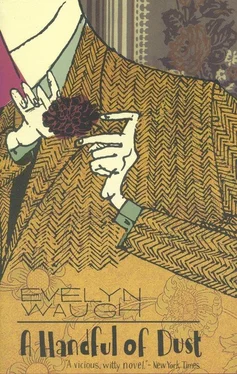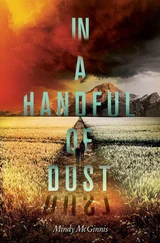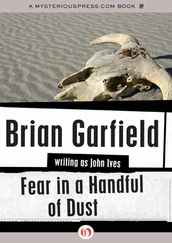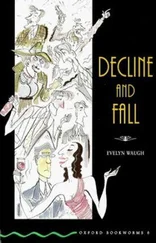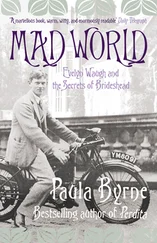Evelyn Waugh - A Handful Of Dust
Здесь есть возможность читать онлайн «Evelyn Waugh - A Handful Of Dust» весь текст электронной книги совершенно бесплатно (целиком полную версию без сокращений). В некоторых случаях можно слушать аудио, скачать через торрент в формате fb2 и присутствует краткое содержание. Жанр: Классическая проза, на английском языке. Описание произведения, (предисловие) а так же отзывы посетителей доступны на портале библиотеки ЛибКат.
- Название:A Handful Of Dust
- Автор:
- Жанр:
- Год:неизвестен
- ISBN:нет данных
- Рейтинг книги:3 / 5. Голосов: 1
-
Избранное:Добавить в избранное
- Отзывы:
-
Ваша оценка:
- 60
- 1
- 2
- 3
- 4
- 5
A Handful Of Dust: краткое содержание, описание и аннотация
Предлагаем к чтению аннотацию, описание, краткое содержание или предисловие (зависит от того, что написал сам автор книги «A Handful Of Dust»). Если вы не нашли необходимую информацию о книге — напишите в комментариях, мы постараемся отыскать её.
It tells of Brenda, Tony and their friends — a wonderfully congenial group who live by a unique set of social standards. According to their rules, any sin is acceptable provided it is carried off in good taste.
A Handful Of Dust — читать онлайн бесплатно полную книгу (весь текст) целиком
Ниже представлен текст книги, разбитый по страницам. Система сохранения места последней прочитанной страницы, позволяет с удобством читать онлайн бесплатно книгу «A Handful Of Dust», без необходимости каждый раз заново искать на чём Вы остановились. Поставьте закладку, и сможете в любой момент перейти на страницу, на которой закончили чтение.
Интервал:
Закладка:
Mr. Todd put a hand behind Tony's head and held up the concoction of herbs in the calabash. Tony sipped and turned away his head.
“Nasty medicine,” he said, and began to cry.
Mr. Todd stood by him holding the calabash. Presently Tony drank some more, screwing up his face and shuddering slightly at the bitterness. Mr. Todd stood beside him until the draught was finished; then he threw out the dregs on to the mud floor. Tony lay back in the hammock sobbing quietly. Soon he fell into a deep sleep.
Tony's recovery was slow. At first, days of lucidity alternated with delirium; then his temperature dropped and he was conscious even when most ill. The days of fever grew less frequent, finally occurring in the normal system of the tropics, between long periods of comparative health. Mr. Todd dosed him regularly with herbal remedies.
“It's very nasty,” said Tony, “but it does do good.”
“There is medicine for everything in the forest,” said Mr. Todd; “to make you well and to make you ill. My mother was an Indian and she taught me many of them. I have learned others from time to time from my wives. There are plants to cure you and give you fever, to kill you and send you mad, to keep away snakes, to intoxicate fish so that you can pick them out of the water with your hands like fruit from a tree. There are medicines even I do not know. They say that it is possible to bring dead people to life after they have begun to stink, but I have not seen it done.”
“But surely you are English?”
“My father was — at least a Barbadian. He came to Guiana as a missionary. He was married to a white woman but he left her in Guiana to look for gold. Then he took my mother. The Pie-wie women are ugly but very devoted. I have had many. Most of the men and women living in this savannah are my children. That is why they obey — for that reason and because I have the gun. My father lived to a great age. It is not twenty years since he died. He was a man of education. Can you read?”
“Yes, of course.”
“It is not everyone who is so fortunate. I cannot.”
Tony laughed apologetically. “But I suppose you haven't much opportunity here.”
“Oh yes, that is just it. I have a great many books. I will show you when you are better. Until five years ago there was an Englishman — at least a black man, but he was well educated in Georgetown. He died. He used to read to me every day until he died. You shall read to me when you are better.”
“I shall be delighted to.”
“Yes, you shall read to me,” Mr. Todd repeated, nodding over the calabash.
During the early days of his convalescence Tony had little conversation with his host; he lay in the hammock staring up at the thatched roof and thinking, about Brenda. The days, exactly twelve hours, each, passed without distinction. Mr. Todd retired to sleep at sundown, leaving a little lamp burning — a hand-woven wick drooping from a pot of beef fat — to keep away vampire bats.
The first time that Tony left the house Mr. Todd took him for a little stroll around the farm.
“I will show you the black man's grave,” he said, leading him to a mound between the mango trees. “He was very kind. Every afternoon until he died, for two hours, he used to read to me. I think I will put up a cross — to commemorate his death and your arrival — a pretty idea. Do you believe in God?”
“I suppose so. I've never really thought about it much.”
“I have thought about it a great deal and I still do not know … Dickens did.”
“I suppose so.”
“Oh yes, it is apparent in all his books. You will see.”
That afternoon Mr. Todd began the construction of a headpiece for the Negro's grave. He worked with a large spokeshave in a wood so hard that it grated and rang like metal.
At last when Tony had passed six or seven consecutive nights without fever, Mr. Todd said, “Now I think you are well enough to see the books.”
At one end of the but there was a kind of loft formed by a rough platform erected in the caves of the roof. Mr. Todd propped a ladder against it and mounted. Tony followed, still unsteady after his illness. Mr. Todd sat on the platform and Tony stood at the top of the ladder looking over. There was a heap of small bundles there, tied up with rag, palm leaf and raw hide.
“It has been hard to keep out the worms and ants. Two are practically destroyed. But there is an oil the Indians make that is useful.”
He unwrapped the nearest parcel and handed down a calf bound book. It was an early American edition of Bleak House .
“It does not matter which we take first.”
“You are fond of Dickens?”
“Why, yes, of course. More than fond, far more. You see, they are the only books I have ever heard. My father used to read them and then later the black man … and now you. I have heard them all several times by now but I never get tired; there is always more to be learned and noticed, so many characters, so many changes of scene, so many words … I have all Dickens books here except those that the ants devoured. It takes a long time to read them all — more than two years.”
“Well,” said Tony lightly, “they will well last out my visit.”
“Oh, I hope not. It is delightful to start again. Each time I think I find more to enjoy and admire.”
They took down the first volume of Bleak House and that afternoon Tony had his first reading.
He had always rather enjoyed reading aloud and in the first year of marriage had shared several books in this way with Brenda, until one day, in a moment of frankness, she remarked that it was torture to her. He had read to John Andrew, late in the afternoon, in winter, while the child sat before the nursery fender eating his supper. But Mr. Todd was a unique audience.
The old man sat astride his hammock opposite Tony, fixing him throughout with his eyes, and following the words, soundlessly, with his lips. Often when a new character was introduced he would say, “Repeat the name, I have forgotten him,” or “Yes, yes, I remember her well. She dies, poor woman.” He would frequently interrupt with questions; not as Tony would have imagined about the circumstances of the story — such things as the procedure of the Lord Chancellor's Court or the social conventions of the time, though they must have been unintelligible, did not concern him — but always about the characters. “Now why does she say that? Does she really mean it? Did she feel faint because of the heat of the fire or of something in that paper?” He laughed loudly at all the jokes and at some passages which did not seem humorous to Tony, asking him to repeat them two or three times; and later at the description of the sufferings of the outcasts in “Tom-all-alones” tears ran down his cheeks into his beard. His comments on the story were usually simple. “I think that Dedlock is a very proud man,” or, “Mrs. Jellyby does not take enough care of her children.”
Tony enjoyed the readings almost as much as he did. At the end of the first day the old man said, “You read beautifully, with a far better accent than the black man. And you explain better. It is almost as though my father were here again.” And always at the end of a session he thanked his guest courteously. “I enjoyed that very much. It was an extremely distressing chapter. But, if I remember rightly, it will all turn out well.”
By the time that they were in the second volume however, the novelty of the old man's delight had begun to wane, and Tony was feeling strong enough to be restless. He touched more than once on the subject of his departure, asking about canoes and rains and the possibility of finding guides. But Mr. Todd seemed obtuse and paid no attention to these hints.
Читать дальшеИнтервал:
Закладка:
Похожие книги на «A Handful Of Dust»
Представляем Вашему вниманию похожие книги на «A Handful Of Dust» списком для выбора. Мы отобрали схожую по названию и смыслу литературу в надежде предоставить читателям больше вариантов отыскать новые, интересные, ещё непрочитанные произведения.
Обсуждение, отзывы о книге «A Handful Of Dust» и просто собственные мнения читателей. Оставьте ваши комментарии, напишите, что Вы думаете о произведении, его смысле или главных героях. Укажите что конкретно понравилось, а что нет, и почему Вы так считаете.
